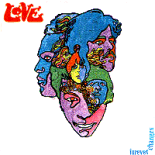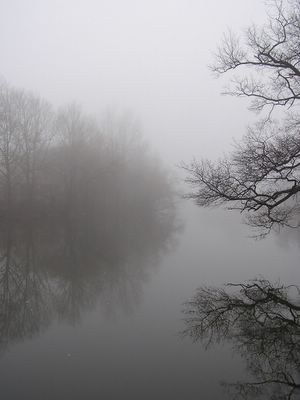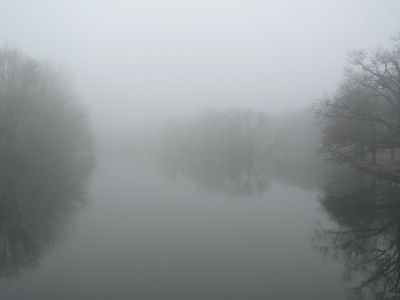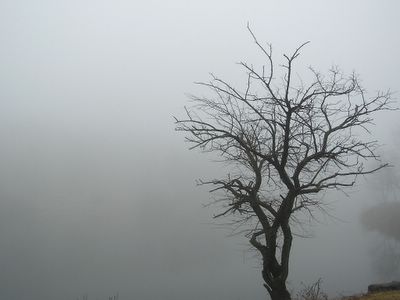April 5
FOUR PROSE POEMS
BROKEN WINDOW
Just one ritual. She cries in the morning when she wakes. We can benefit from the direction of the other, according to an unwritten law that exists solely for the sake of bursting into song. Just the burden of the thought that breathless work is possible, after all, at the end of a day of grey hours. Yet the anxiety is still there in her eyes that he will make fools of them both, waiting to make conversation with the stranger at the bar, less cunning than before. I stop to look through locked iron gates into the empty park at dusk. It turns out the bastard was right. We were free, but it was an empty freedom, like wandering in and out of abandoned houses at will.
MINE BEFORE NIGHT
Come to the trick of avoiding touch, wandering through Sunday afternoon crowds by the river Po, obliged to come to a sticky end. Sudden warmth under the sheets, skin against skin, afraid for a moment she would repulse him. Power could not reside all in one room, whatever their illusions. There is another circle, unseen, behind this one. A shirt takes the shape of the chair it hangs on, the time of vacancy where we worship winners. Granted, but what can replace the heat of your hands, playful at the crucial moment? Roles crumble, delve to a deeper set.
BEGGING
Let the bottom fall out of books placed one by one on your knee. A no from next door, and the sob of a child, reality in the power of others, not what we are. Who was the first to put out his hand? Not much to choose from. The land as we know it melts before our eyes. A man slaughters on a full stomach, wine on his breath, whispers into an ear sliced off. Letter by letter, you write down the unpronounceable name, wishing you were anywhere but here, the ditch by the road no one travels now .
UNTIL WE DIE
All kinds of freedom. Two figures approach each other across a distance, then pass without a word or a nod of the head. We keep trying. Being poor, we are at the mercy of others. A final word, a last-ditch attempt to make us see sense. You'll be useless one day, too. Threats and obscenities buzz in our ears. Yet there is still a dream wondered by friends. Who will be the first to speak of rivulets of steam down white tiles? Silence is an unauthorised gift. All kinds of monsters are possible, and new births with them.
© Ian Seed, 2005
April 6
I don’t have much to say about the Neil Astley lecture, I think. What he’s up to is so dim and miserable that long before I reached the end of the 17 or so pages of it I was thinking there was more to life than wasting a decent-size chunk of it on the pathetic, poorly-argued and self-justifying thoughts of one of the most powerful people in poetry world. And there is. It’s just that this morning I was at work, and it was a quarter past seven and there wasn’t much happening, and I was reading from "The Paris Review" interviews – interviews are pretty good things to read when you’re likely to be interrupted by a telephone call every few minutes, and also I like to re-read stuff I read years ago, when I was young and innocent. This morning I was reading the one with T.S.Eliot, and I came across this:
…. among the public there are always people who prefer mediocrity, and when they get it, say, “What a relief! Here’s some real poetry again.”
which made me think of Neil Astley, which at a quarter past seven in the morning was not an especially pleasant thought. Yesterday morning I re-read the interview with Marianne Moore. She was something else, by all accounts. I love this:
Interviewer: But how does professionalism make a writer lose his verve and pugnacity?
Moore: Money may have something to do with it, and being regarded as a pundit; Wallace Stevens was really very much annoyed at being catalogued, categorized, and compelled to be scientific about what he was doing – to give satisfaction, to answer the teachers. He wouldn’t do that. I think the same of William Carlos Williams. I think he wouldn’t make so much of the great American language if he were plausible; and tractable. That’s the beauty of it; he is willing to be reckless; if you can’t be that, what’s the point of the whole thing?
Let’s repeat that last bit, and put it in bold:
That’s the beauty of it; he is willing to be reckless; if you can’t be that, what’s the point of the whole thing?
April 8
INTO THE WEEKEND
Incidentally, the Neil Astley lecture which was temporarily removed from the StAnza website, seems today to have been reinstated. I don't know if this is a good or bad thing. But, out of interest, Tim Allen has interesting things to say about it over on the British Poets discussion list. There are some other good contributions there, too.
Okay. I'm off out tonight for a meal and, I trust, a bottle of wine. While I was composing this little piece and posting it, I was listening for the first time to the LP by Antony & The Johnsons. It's called "I Am A Bird Now" and I suggest if you fancy being blown away you dig it out. Have a good weekend, why don't you?
April 11
LOVE AND GENIUS
 The first time I saw them was three or four years ago in a small club in Sheffield. It was probably when they first started touring again after all those years. I’m not sure. I can remember having my doubts about the wisdom of it all. However brilliant Love were back in the good old days of the 1960s, this was only going to be Arthur Lee and a bunch of musicians using the name. I was wrong. It was a genius, singing genius songs that were over 30 years old but sounded like they were fresh this morning, with a band doing them more than justice. I lost count of the times it all sent shivers down my spine that night. It was mesmeric. The second time was in the big, impersonal space of Rock City. It was another great show. It was pretty much the same show, because they always do pretty much the same show. But yes, it was great again, or.
The first time I saw them was three or four years ago in a small club in Sheffield. It was probably when they first started touring again after all those years. I’m not sure. I can remember having my doubts about the wisdom of it all. However brilliant Love were back in the good old days of the 1960s, this was only going to be Arthur Lee and a bunch of musicians using the name. I was wrong. It was a genius, singing genius songs that were over 30 years old but sounded like they were fresh this morning, with a band doing them more than justice. I lost count of the times it all sent shivers down my spine that night. It was mesmeric. The second time was in the big, impersonal space of Rock City. It was another great show. It was pretty much the same show, because they always do pretty much the same show. But yes, it was great again, or.Having said which, last night they rang a few changes. Arthur played the harmonica quite a bit, and really well. They played stuff that’s set to be on a new record, and it sounded good. They also had with them this time around Johnny Echols, the band’s original lead guitarist alongside the rest of the regular gang, and that was really cool. I wonder what he’s been up to for the last thirty years…..
Anyway, the only other thing I have left to say is that the word genius is bandied around quite a lot, I guess. I bandy it myself. But from the moment the first notes of “Alone Again Or” kick in, there is only one word to describe what Arthur Lee wrote by way of songs back in the 1960s, and the word is, no apologies, genius.
April 12
STANDING AS ONE
April 16
Review by Clive Allen
Living on the Difference by Mike Barlow
The Dog Who Thinks He’s A Fish by Chris Beckett
(both £6. 99 from Smith/Doorstop Books)
Here are just two more poetry paperbacks that have been sitting on my books-I-need-to-think-of-something-interesting-to-say-about pile for quite a long time now, and that I can no longer put off trying to be interesting about.
First of all then, some generalised and not strictly literary comments. After being in the game (and it is very much a game, fellow poetry fans, I think you’ll agree) for as long as they have, those enterprising people at Smith/Doorstop certainly know how to produce a nice-looking book of poems. Both these titles weigh-in at around sixty pages and sport attractive/interesting/go on, pick me up why don’t you?-style cover images. In addition to the obligatory blurb, each one also has a little inset photo of The Poet Himself on the back cover - often a risky business, particularly if they’re of the madly-staring, photo-booth sort. Happily these aren’t like that. Mike Barlow is bearded and serious and has something of a pained expression in a proper-poet kind of way; whilst Chris Beckett has gone for the grinning-a-bit-wimpishly look (actually I think he looks a bit like me, which is sad for both of us). Gillian Clarke says of Mike Barlow’s book that it ‘… has a cumulative power and a particularly individual voice’ and Fred D’Aguiar thinks Chris Beckett’s collection ‘… is full of memorable riches’. Well, we’ll see, shall we …?
Mike Barlow has worked in the probation service (I wonder if he ever came across that nice Mr. Armitage?) and is a visual artist as well as a poet. Both these biographical details have a bearing on the subject matter of his poetry – inasmuch as many of his poems are about marginalised people and also about the landscape, or at least have a strong visual sense of place. He uses language in a good, plain, unambiguous sort of way which, at its best, has a winning directness to it. ‘Idle Talk’ begins …
That’s all it was – floods and forecasts.
Rain erased the edges of the town,
the swollen river curdled where it swept the quay.
Without a change of tone you said:
My wife’s taken our three year old to live
two hundred miles away with someone else.
Which I think gives a sense of the sort of thing on offer here: it takes a slice of life and stares hard at the layers. And this is no mean feat – there are some enviable moments of bravura descriptive writing in ‘Living on the Difference’. But at times I found myself longing for a bit of humour, because funny is one of the things life is, even when it’s horribly serious, if you know what I mean. Perhaps it’s just a question of taste. Whilst I’m picking at threads, the other failing I found here was the need to tie poems up with a punchy last line or two. You know the sort of thing; we’ve all done it. There’s a rather prose-y poem called ‘Out After Dark’, about a boyhood fishing expedition, a Raymond Carver-ish affair. The tone is plain to the point that had me wondering whether it might not have been more successful as a piece of prose (but that’s another critical tack altogether – which I’m going to ignore for now). This is the last stanza …
For being out late and panicking the family
I went straight to bed. I lay there with the light out,
shivering as I looked up at the ceiling
and imagined the night sky full of fish.
There is no reason for the night sky to be full of (imaginary) fish, is there? That’s just there to tie everything in with the fishing-trip story. The whole thing ends perfectly well with the boy shivering and looking up at the ceiling, which actually is a much more convincing image.
But don’t let that put you off. Go to the Smith/Doorstop website where you can read a sample poem from ‘Living on the Difference’ and if you like that then my guess is you’ll like the rest of the book.
I am a terrible sucker for a good title. I confess it freely. I was once seduced into buying a genuinely abysmal LP just because it was called ‘Vampires Stole My Lunch Money’. If I saw it on CD I think I might even be tempted to buy it again. It’s that much of a problem with me. And ‘The Dog Who Thinks He’s A Fish’ is another top title. It made me want to like the book even before I’d read it.
There’s also a poem, quite early on in Chris Beckett’s collection, called ‘On Hearing Joshua Bell Play Schubert’s Fantasy in C Major while my left leg is in cramp’. (This could well be title heaven, I thought...) But sadly the title is the best thing about the poem, because everything that happens in it has already happened in the title. The poet hears the piece of music, gets cramp in his leg, the poem ends.
The excitement over titles has got me rushing ahead of myself a little here. I think we should have a few facts, by way of a proper introduction… I’d never heard of Chris Beckett, but clearly other people have - Fred D’Aguiar, Pascale Petit and Moniza Alvi, no less. And they all say flattering things about his poetry on the back cover of ‘The Dog Who Thinks He’s A Fish’. His work has appeared in posh-ish mags, like Ambit, and has picked up prizes in, amongst others, the Arvon Competition. So he’s no slouch poetry-wise. He grew up in Ethiopia (there’s a section in the book dedicated to his memories of and reflections about Africa) and, after what sounds like an expensive private education, now trades sugar on the international markets. The poetry has playfulness and a sort of low-voltage surrealism about it. There are lots of high-brow references, too - to the likes of Elizabeth Bishop, Bach, Schubert, Pound, Balzac, Frank O’Hara – which, it has to be said, just occasionally come across as a bit too … knowing.
Half a dozen or so poems, dealing with the poet’s experiences at boarding school, are gathered together under the chapter heading of ‘Odyssey’, and take their titles (Scylla, Polyphemus etc) from Homer’s epic. Nothing wrong with that, of course, but unless the link to Homer is heavily ironic, then it does give the poems quite a bit of allegorical baggage to lug around. All the same I found them relatively engaging and amusing, although there were moments, such as …
…Matron barking at us to change
into our puny swimming trunks,
as though she had six vicious curs
kennelled underneath her skirts
(from ‘Scylla at Whitby’)
… which made me stop and wonder: ‘six vicious curs / kennelled underneath her skirts’? Now, I know just enough Greek mythology to figure out that this is one of those classical references to the story of Scylla (she was half of a very popular double act with her partner Charybdis), but don’t you think it sounds a bit arch, a bit too leaden and contrived? Later on in the poem Matron is on hand to towel down the shivering boys, ply them with lemonade (not lashings of ginger beer?) and make them feel ‘… half / grown up, but more than half still pups’. The pups are simply there to refer us neatly back to those ‘vicious curs’, and let us know the poem is a completed entity. Somehow it feels a tad clunky.
I also winced a bit at a poem called ‘Still Life with Niece and Skull’. This is an otherwise well done piece about mortality – which has appealingly clever and deft references to vanitas painting. However, the concluding line of the first stanza has the niece asking, ‘Uncle, do you miss your youth?’ and in the last line of the poem the uncle answers this with, ‘…no, Katie, I don’t miss my youth. I have yours.’ Which I find so unforgivably sentimental it actually makes my teeth ache.
You know, I’m sounding way too grudging about this book and I don’t mean to, because for all the occasional misfires there are lots of poems that do hit the target. There are plenty of things to enjoy about ‘The Dog Who Thinks He’s A Fish’.
These are, on the whole, very clean poems, very thoughtfully and tidily put together, which sometimes teeter on the brink of smug, but usually manage to tip back into civilised and polite. Rather like Billy Collins poetry – of which much of Chris Beckett’s work reminds me – it’s wonderfully easy to read. That can, of course, be both a good and bad thing; sometimes we need a little resistance in a poem, just to let us know it’s there, make us think about the way it’s working, the way the language is functioning. But when it works well … well, judge for yourself. This is the beginning of ‘What To Do With Clothes’
When I go let me have nothing
that I don’t need with me.
Let me be like the old man
who went hopping down the road
on a Saturday morning, with his
clothes dropping off one by one,
so that when he got to the beach,
he only had his large black shoes,
and those he untied very slowly
while humming a tune …
‘The Dog Who Thinks He’s A Fish’ doesn’t quite live up to the promise of its title, but then again I’m not sure anything could.
© C. J. Allen, 2005
April 20
ON OBSERVATION (AT LEAST, IT STARTS OUT THAT WAY ....)
My point is observation: I’ve been doing some. Yesterday on the walk home from work at lunchtime I saw two things. I almost wish I’d had my swish digital (I don’t carry it with me because I can’t be bothered) camera with me.
One thing was the sign outside the church. This church has a big billboard type thing outside it, and it always has an eye-catching slogan on it. You know, like “ A Jesus Isn’t Only For Christmas”, that kind of thing. Currently it says “God Loves Everyone?”. I was completely thrown by that Question Mark, and was still pondering it when I got home. Of course, I worked it out, and I shall be writing to the Vicar to congratulate him on being more eye-catching than usual. But I wonder if everyone will figure it out, or simply remain puzzled. Not everyone is as clever as me.
My puzzlement was briefly interrupted by someone I saw. I’m not sure if he was a chav, strictly speaking, but he was wearing some decidedly chav-type things. He was around twenty, I reckon, although he may have been twelve. I guess the stubble on his chin mitigated against that. He was wearing some spectacularly bad taste trainers, sports bottoms with a stripe down the side and some kind of designer logo on the leg, a hooded fleece-type thing which was too big for him and was also adorned with logos (the sleeves of this were pushed up, to make him look, I think, somewhat ready for anything, preferably a fight), and he had on one of those shapeless hats which probably have a name, but which I don’t know the name of. They are like skull caps but are big enough to get your entire head in. He was a bit grubby looking. He scowled in a very street way. If I’d had my camera and taken a photo of him I suspect I wouldn’t be here now to tell you about it. Anyway, it was the furled umbrella he was carrying which caught my eye. It’s such a simple thing, a black umbrella. You wouldn’t think it could undermine anyone's image so completely and so wonderfully.
Then I went back to thinking about that Question Mark, and I was so wrapped up in my thoughts I almost didn’t see the bus bearing down on me as I crossed the road. It was a narrow escape, but I survived and was able to go to a poetry reading at The Flying Goose in the evening. The readers were Adrian Buckner, who now edits the fast-improving Poetry Nottingham magazine, and Andy Croft. The latter is probably the better known of the two, and his entertaining, fast-moving and (big deep breath) rhyming poetry went down very well. I tended to think that by the time the introductions to and explanations of the poems were over I wasn't all that bothered about hearing the poems, but even I have to admit the poems were funny and well done. But later, in the pub, my cronies and I were in general agreement that we preferred our poetry to be slightly more challenging. Adrian Buckner read really well. The last time I saw him read (the only time I'd seen him read, actually) was in a cold and dispiriting (and closed) library cafe, and he'd been somewhat diffident and quiet. Last night, when I and others had been in fear of him being blown aside by the exuberance of Andy Croft, he delivered a sound, confident and assured reading of some excellent poems. He was serious and funny. I was pretty impressed, and you don't find me saying that very often about poets reading their poems out loud.
April 23
Photographs by Mark Hillringhouse
A Note On The Photographs
For the last two years, I have been going out to shoot around the city of Paterson with different cameras using different formats. I was working with large-format photographer George Tice and helping him with his book project on the city. And I began reading William Carlos Williams again to see if I could get new insights into his work. I read a section of Williams’ “Paterson,” a poem in five books, which anthropomorphizes the city and creates an allegory for the poetic soul in search of its muse.
The poem starts off at the Great Falls of the Passaic River (which supplies Paterson with its water and power), and moves out from there to Garret Mountain (which overlooks the city), and then to the public library downtown. I would read a section of the poem and the next day I would walk to the actual location that was referenced in the poem and take photos.
These photos were taken just behind the falls on a day when the city was shrouded in a deep winter fog. The river seemed to disappear into still silence. I noticed that the water was barely moving and that the surface was smooth. The trees reflected on the mirror surface of the water creating a double image and the colors were so subdued that the effect is almost black and white.
I felt a sense of calm in being caught in the twilight of river and sky blending together in the winter afternoon. I am reminded of those Japanese ink washes of Zen monks who balance at the edge of nothingness. There’s a solitary sense of being alone with nature, of finding solace in the mystery of not knowing where the horizon ends or where the sky begins.
Images and Text © Mark Hillringhouse, 2005
April 26
IT'S TODAY, AS USUAL
Henry Green's "Doting" (Green is really fascinating. His prose style does your head in. Annabel is about to open her mouth and let Mr Middleton look at her "perfect gums": "... the girl, with a 'here you are' leant over to the husband and opened wide the pearly gates. Her wet teeth were long and sharp, of an almost transparent whiteness. The tongue was pointed also and lay curled to a red tip against her lower jaw, to which the gums were a sterile pink. Way back behind, cavernous, in a deeper red, her uvula seemed to shrink from him. But it was the dampness, the cleanliness, the fresh-as-wet-paint must have made the man shut his lips tight, as, in his turn, he leant over hers and it was then, or so he, even, told his wife after, that he got, direct from her throat, a great whiff of flowers."); some Sherlock Holmes ("..... a man who seldom took exercise for exercise's sake. Few men were capable of greater muscular effort, and he was undoubtedly one of the finest boxers of his weight that I have ever seen; but he looked upon aimless bodily exertion as a waste of energy, and he seldom bestirred himself save where there was some professional object to be served. Then he was absolutely untiring and indefatigable. That he should have kept himself in training under such circumstances is remarkable, but his diet was usually of the sparest, and his habits were simple to the verge of austerity. Save for the occasional use of cocaine he had no vices, and he only turned to the drug as a protest against the monotony of existence.... "), and Redell Olsen's "Secure Portable Space". The Olsen will be reviewed here in due course. It involves, in part, a poet who put on Mickey Mouse ears and walked in circles around a London bookshop all day reading from a list of heroes and superheroes. Whets your appetite, doesn't it? As for listening to, there are The Decemberists' recent “Picaresque” ("Here she comes in her palanquin, on the back of an elephant, on a bed made of linen and sequins and silk…."),Desaparecidos' “Read Music Speak Spanish” ("adolescence made her an activist / now she is the one who does all the lecturing / they got eighteen holes you should have told them to dig one more / your dream is dead"), and Aimee Mann's new “The Forgotten Arm”, which I don't know any of the words to yet. Actually I'm listening to loads more than these three, but they are kind of top of the list. I've also been playing Brendan Benson's "Alternative To Love". He's on at the Rescue Rooms this week and I think I may go along and have a hear. If I do you'll no doubt find out what I thought about it all.
The sun was supposed to shine today, as it has the previous few days, because I have a free day and rather fancied a walk out in Spring sunshine. If I had a dog I was planning to take it with me. Instead, it was dull and overcast. Then the sun shone briefly, but it was just kidding: a little later it poured with rain. Then we returned to dull and overcast. Oh, also I should draw your attention to (if you haven't already come across it) an article about John Ashbery in a recent Guardian. If I had a cat I would stroke it. If the goldfish were still alive I would take them for a swim.
Actually, there is one other link I should do. It's this one.
April 27
OF PETER DENT
April 29
TODAY WAS GREAT, THANK YOU (YESTERDAY EVENING WASN'T)
It’s a pity I can’t say that yesterday evening was a pretty good evening. The best thing about it was the sky: walking down to the Rescue Rooms it was a wonderful sunset, several shades of pink and red, sun and clouds, everything aglow, and as I was walking along Forest Road a bloke some yards behind me on the other side of the road cried out "That is so fucking beautiful, isn't it?" which rather took me by surprise because people don’t often shout such things out loud on Forest Road, especially as it's a haunt of self-employed women who hang around on street corners asking you if you are looking for business, but Yes, I had to agree, it was a beautiful sky, although I do not condone swearing.
At the Rescue Rooms it was Brendan Benson, supported by Hal. I have already written about Hal elsewhere. I have no intention of repeating myself, except to say they are dreadful. A tune with a melody would make all the difference. Some heart and soul, some sense of desire, would be a bonus. Recently, a national newspaper touted their LP as a possible record of the year. Whoever wrote that review must be the drummer's dad. I was sort of looking forward to Brendan Benson. I’ve been listening to his recent "Alternative to Love" LP. It’s okay. I wouldn’t work up a sweat about it, but it’s okay. What you might call intelligent indie-pop. New ground isn’t being broken, but that’s not always what matters. Friends, though, and also my son Tim, are fans, and say his other stuff is good, too.
So, he has this band, and they evidently think they rock. My friend Nigel said they were massacring the songs. I was totally bored. The guy just about managed to say a few words to the audience, but it amounted to introducing a few songs in a desultory fashion and that was about it. I think he was there to be admired. When Hal were on he’d been sat at the table where the CDs were for sale, talking to a couple of girls. It would have been a good idea if he’d stayed there. The girls would have been happy, and we could have had an early night.
All in all it was a very disheartening evening. I kept thinking it was all about music the performers themselves didn’t care much about. They seemed to care more about something else. Image, perhaps. Or just indulging themselves. I can’t remember the last time I witnessed such a vacuous affair. Oh yes, it was The Magic Numbers and, um, Hal…… Mind you, some of the audience were into the same kind of thing. A chap in front of me, while I was leaning on the bar trying to stay awake, spent more time playing with the camera on his mobile phone than paying any attention to the music. Every now and then he’d stop and bop a bit, but he always went back to the phone to check his pictures, and to see if he’d got any messages. I felt very much at one with one of the girls behind the bar. She spent all of Benson's set reading the newspaper.
That’s why it was so good to read John Harvey’s novel today. After last night I was desperately in need of something genuine. A class act, and no messing around. Flesh and blood, for sure.




